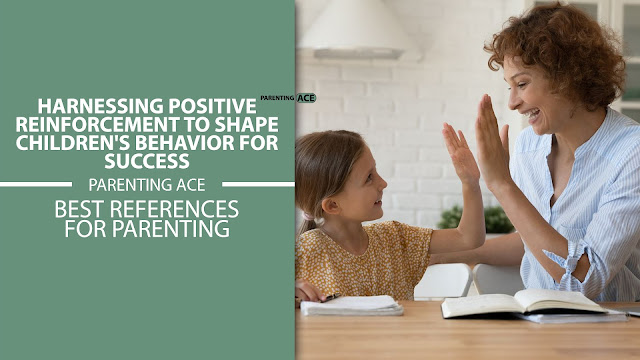The Power of Positive Reinforcement: Shaping Children's Behavior for Success
In the intricate tapestry of child development, positive reinforcement emerges as a guiding light, illuminating pathways towards constructive behavior and lifelong success. In this blog post, we embark on a journey into the profound benefits of positive reinforcement in shaping children's behavior. From nurturing self-esteem to fostering strong relationships and instilling valuable life skills, join us as we explore the transformative power of positive reinforcement in laying the foundation for a brighter future for our children.
 |
| Harnessing Positive Reinforcement to Shape Children's Behavior for Success |
What are The Benefits of Positive Reinforcement In Shaping Children's Behavior?
Positive reinforcement stands as a cornerstone in the realm of child development, offering a potent tool for shaping behavior and fostering positive growth. As parents, educators, and caregivers, understanding the profound benefits of positive reinforcement is crucial in nurturing children's development and fostering a conducive environment for their success.
1. Encourages Desirable Behavior
Positive reinforcement involves acknowledging and rewarding desirable behavior, thereby increasing the likelihood of its recurrence. By praising or rewarding children for their efforts or achievements, we provide them with immediate feedback, reinforcing their understanding of what behaviors are valued and encouraged. This encourages children to strive for excellence and engage in behaviors that contribute to their overall well-being and success.
2. Builds Self-Esteem and Confidence
One of the most significant benefits of positive reinforcement is its role in building children's self-esteem and confidence. When children receive positive feedback and recognition for their accomplishments, they develop a sense of competence and self-worth. This, in turn, motivates them to take on new challenges, explore their capabilities, and persist in the face of obstacles. By consistently reinforcing positive behaviors, we empower children to believe in themselves and their abilities, laying the groundwork for future success.
3. Strengthens Parent-Child Relationships
Positive reinforcement fosters a nurturing and supportive environment within the parent-child relationship. When parents acknowledge and celebrate their child's achievements, they strengthen the bond of trust and mutual respect. This creates an atmosphere where children feel valued, understood, and supported, enhancing communication and cooperation between parents and children. As a result, children are more likely to seek guidance and support from their parents, leading to healthier relationships and overall family dynamics.
4. Shapes Long-Term Behavior Patterns
Positive reinforcement plays a crucial role in shaping long-term behavior patterns and promoting positive socialization. By consistently reinforcing desirable behaviors such as kindness, empathy, and cooperation, we instill values that guide children's interactions with others. Over time, these reinforced behaviors become internalized as part of children's moral compass, influencing their choices and actions in various social contexts. Thus, positive reinforcement not only encourages immediate compliance but also lays the foundation for prosocial behavior and responsible citizenship in the future.
5. Fosters a Positive Learning Environment
In educational settings, positive reinforcement creates a positive learning environment conducive to academic success and personal growth. When teachers praise students for their efforts and achievements, they create a classroom atmosphere that fosters motivation, engagement, and enthusiasm for learning. This, in turn, enhances students' academic performance, increases their willingness to participate in classroom activities, and promotes a lifelong love of learning. By leveraging positive reinforcement in education, we empower students to reach their full potential and become lifelong learners.
In conclusion, the benefits of positive reinforcement in shaping children's behavior are undeniable. From encouraging desirable behavior and building self-esteem to strengthening parent-child relationships and shaping long-term behavior patterns, positive reinforcement serves as a powerful tool for promoting positive growth and development. By incorporating positive reinforcement into our interactions with children, we can create a nurturing environment that empowers them to thrive and succeed in all aspects of life.




